Happy New Year from Pioneer Institute
/0 Comments/in Featured /by Editorial Staff Share on Facebook
Share on Twitter
Share on
LinkedIn
+
We hope you are taking time to celebrate and find peace during this season. Thank you for your support for Pioneer, which has helped us stay focused on steering the state’s debate on the pandemic response, and making progress on our key policy objectives. Here’s to a great 2021 for Massachusetts and the country.
Recent Posts

NYT Best Seller Laurence Bergreen on 530th Anniversary of Christopher Columbus Discovering the New World
On this special Columbus Day edition of “The Learning Curve," guest host Pioneer Institute's Mary Z. Connaughton talks with Laurence Bergreen, a prize-winning biographer, historian, chronicler of exploration, and the author of Columbus: The Four Voyages, 1492-1504. Mr. Bergreen discusses what people should know about the life, career, and myths around Christopher Columbus, the courageous, ruthless, and complicated explorer and navigator, on the 530th anniversary of his history-changing and ever-controversial discovery of the New World.

NACSA’s Dr. Karega Rausch on Charter Public School Authorizing
This week on “The Learning Curve," Cara Candal and Gerard Robinson talk with Dr. Karega Rausch, President and CEO of the National Association of Charter School Authorizers. Dr. Rausch shares some of his background, his interest in K-12 education reform and charter public schools, and lessons from Indiana and other states that inform his work.
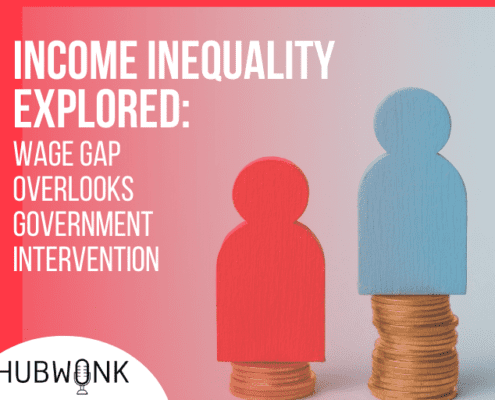
Income Inequality Explored: Wage Gap Overlooks Government Intervention
This week on Hubwonk, host Joe Selvaggi talks with John F. Early, economist and author of the newly released book, The Myth of American Inequality, about the history of income inequality, its true size, and trends. They also discuss how census data used in policy decision-making misses nearly all the effects of government intervention and distorts the truth about the income American families actually have to spend.

Khan Academy’s Sal Khan & ASU Prep Digital’s Amy McGrath on the Khan World School @ ASU Prep
This week on “The Learning Curve," Cara Candal and Gerard Robinson talk with Sal Khan, founder and CEO of Khan Academy, and Amy McGrath, the Chief Operating Officer of ASU Prep and Deputy Vice President of ASU Educational Outreach.

Collegiate Kangaroo Courts: Title IX Rewrite Expels Free Expression and Due Process
This week on Hubwonk, host Joe Selvaggi talks with Pacific Legal Foundation Senior Fellow Alison Somin about the Biden Administration’s proposed modifications to Title IX fair treatment guidelines, challenging principles of free speech and due process, and potentially chilling the culture of free debate in American universities.

Hoover at Stanford’s Dr. Niall Ferguson on Britain, the English-Speaking World, & the Politics of Catastrophe
This week on “The Learning Curve," Cara Candal and Gerard Robinson talk with Dr. Niall Ferguson, the Milbank Family Senior Fellow at the Hoover Institution, Stanford University, and a senior faculty fellow of the Belfer Center for Science and International Affairs at Harvard. He is the author of 16 books, including "Doom: The Politics of Catastrophe."

Study: Legislators Must Answer Key Questions Before Setting Policy for App-Based Rideshare/Delivery Workers
After Massachusetts’ Supreme Judicial Court declared an initiative that was to appear on the November ballot unconstitutional, the issue of how to classify app-based rideshare/delivery workers is back in the hands of the state Legislature. A new study published by Pioneer Institute distills from the research literature eight questions legislators must answer before determining how to address this fast-growing industry.
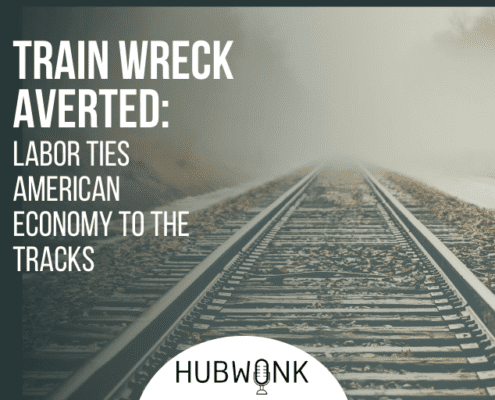
Train Wreck Averted: Labor Ties American Economy to the Tracks
This week on Hubwonk, host Joe Selvaggi talks with Dominic Pino, Thomas L. Rhodes Fellow at the National Review Institute, about his research and writing on the recently averted rail strike, including how the rail industry is organized, what labor’s demands were, and how the prospect of a nationwide rail strike exposed vulnerabilities within the American economy.

Two Stars in a Glowing Voc-Tech Education System
“A Tale of Two City Schools: Worcester Tech and Putnam Academy Become Models for Recovery” is a new white paper by Pioneer Institute that analyzes how Worcester Tech and Putnam Academy — schools with high numbers of low-income and special needs students — leapt from the bottom of Massachusetts voc-tech rankings to become leaders among local schools.

Independent Institute’s Dr. Bill Evers & Ze’ev Wurman on K-12 STEM Education & California’s Woke Math
This week on “The Learning Curve," Cara Candal and Gerard Robinson talk with Dr. Bill Evers and Ze'ev Wurman, of the Independent Institute, about the challenges of ensuring all students have access to quality K-12 math and science education in California and across the U.S.
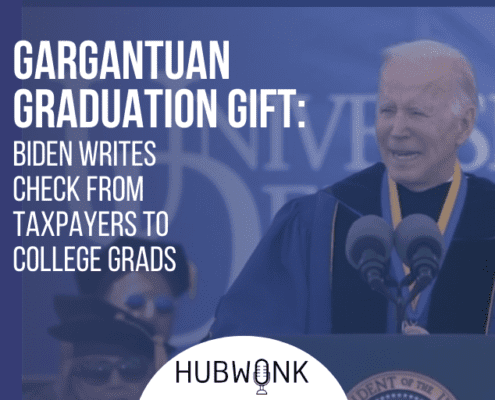
Gargantuan Graduation Gift: Biden Writes Check From Taxpayers To College Grads
This week on Hubwonk, host Joe Selvaggi talks with Dr. Beth Akers, AEI Senior Fellow, about the recent presidential executive order to cancel an estimated $500 billion in outstanding student debt. They explore who benefits, who pays, and the likely effects on tuition and the borrowing habits of future students.
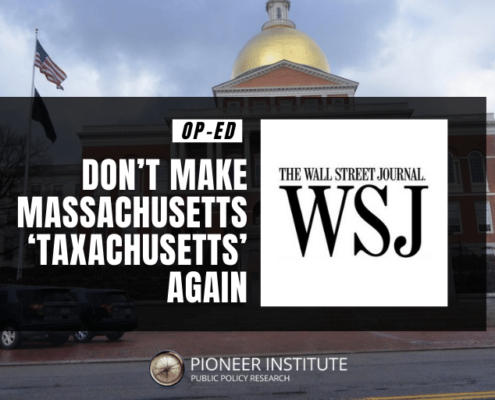
WSJ op-ed: Don’t Make Massachusetts ‘Taxachusetts’ Again
Unlike many blue states, Massachusetts has resisted the temptation to raise taxes on high earners. That antitax fortitude is about to be tested. In November, state legislators will ask voters to approve an amendment to the Massachusetts constitution adding a 4% surcharge to annual income over $1 million.

Oxford’s Prof. Timothy Garton Ash on Poland’s Solidarity, Lech Walesa, & Cold War Lessons for Ukraine
https://www.podtrac.com/pts/redirect.mp3/chtbl.com/track/G45992/mp3.ricochet.com/2022/09/TheLearningCurve_TimothyGartonAsh.mp3
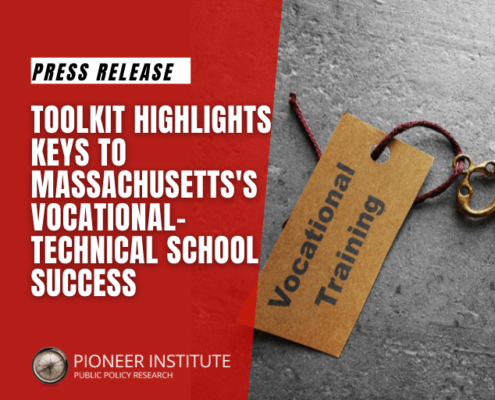
Toolkit Highlights Keys to Massachusetts’s Vocational-Technical School Success
Alternating weeks of academic and vocational education, school autonomy, and close ties with local businesses have been key to the success of Massachusetts's vocational-technical high schools, according to a report published today by Pioneer Institute.

UVA’s Prof. Angel Adams Parham on Classical Education, Black Intellectuals, & Homeschooling
This week on “The Learning Curve," co-hosts Cara Candal and Gerard Robinson talk with Angel Adams Parham, Associate Professor of Sociology and senior fellow at the Institute for Advanced Studies in Culture (IASC) at the University of Virginia, and the author of The Black Intellectual Tradition: Reading Freedom in Classical Literature. Professor Parham shares her background as an academic and former homeschooling mom, her embrace of classical education, and her philosophy about what constitutes a sound humanities curriculum.

MBTA’s Runaway Crisis: Legacy of Neglect Demands Comprehensive Reform
This week on Hubwonk, host Joe Selvaggi talks with Andrew Bagley, Vice President for Policy and Research at Massachusetts Taxpayers Foundation, about their recent report entitled, The MBTA Crisis is Complicated - Fixing It Will Be Too, diving into the details on why the T is in crisis and what the public must demand of policy makers to get it back on track.

UVA’s Two-Time Pulitzer Winner Prof. Alan Taylor on Thomas Jefferson & Education
This week on “The Learning Curve," co-hosts Cara Candal and Gerard Robinson talk with Alan Taylor, the Thomas Jefferson Memorial Foundation Professor of History at the University of Virginia, a two-time Pulitzer Prize winner, and author of the book, Thomas Jefferson's Education. Professor Taylor shares some highlights of Jefferson’s career, his views on the importance of primary and higher public education in serving the political aspirations of his state and region, and Jefferson's role as the architect of the University of Virginia,
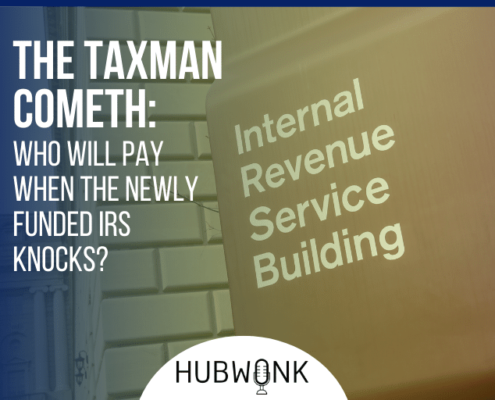
The Taxman Cometh: Who Will Pay When the Newly Funded IRS Knocks?
This week on Hubwonk, host Joe Selvaggi talks with Heritage Foundation senior research fellow Rachel Greszler about the $80 billion investment in the Internal Revenue Service, focusing on the promise to limit enhanced enforcement to high earners and whether the IRS will likely need to expand its net.



